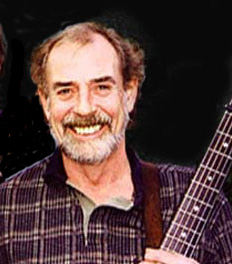

DEREK Moffat had one of the most natural singing voices in the British folk scene and his powerful delivery of Scottish traditional songs was the trademark of The McCalmans, with whom he performed for exactly 37 years. He was known as the quiet member of the group, but at party and pub sessions his deafening interpretations of songs from "South Pacific" and "Oklahoma" surfaced many times where song text accuracy was an absent friend.
Although born in Dundee, he spent almost all his early years in Dysart. He attended Kirkcaldy High School and when he was still a lad he performed at the wonderful Elbow Rooms folk club. It was there, some years later, that we met his sister, Sandra, and their wonderful parents, Cubby and Jimmy.
I met Derek on 6 October, 1964, at the Edinburgh School of Architecture. He was seated to my left and Hamish Bayne was on my right. We started talking about music on that first day and decided to meet for a "musical evening" at my parents' house. Such is fate! Two weeks later we had our first gig, and it was obvious to Hamish and myself that we were on to a good thing with Derek's voice. Hamish was no mean instrumentalist and I could handle a song or two, but the quality was certainly from Derek.
He was also a good painter and the one most likely to succeed in architecture, but his studies got in the way of the music and of course there was no choice - so architecture was bid a fond farewell.
"The Macs" toured the world and Derek enjoyed every second of it. Folk music was his lifeblood and though no traditional session was safe from his Beatles and Buddy Holly interpretations, he had other reasons for liking the job. He was a prolific reader and very knowledgeable about natural history, so whether we were touring in Central American jungles, Australian outback or Arctic wastes, he was in his element. "The biggest frog in the world has yet to be discovered" was one of his pronouncements, which quietened an officers' mess in a Belize rainforest. We were very proud of him.
Derek had his favourite songs over the years, among them "Smuggler", "Seagull Cry", "I Have Seen the Highlands", "The Bells of the Town", "Yellow on the Broom", "Up Wi the Carls O' Dysart" and my personal favourite, "Kirsteen". I could add any song from the Mills Brothers' repertoire that we murdered and now, of course, I have a particular affection for the only song that Derek wrote, "The Back of the Aisler", which was a lovely piece about his childhood in Dysart, composed two years ago.
Derek liked to "party"! Some of his post-gig antics were legendary and I received a lovely e-mail from Mike Harding when he heard the sad news with some of his memories of Derek on tour - but I'm afraid I can't find any that would suit a Scotsman obituary. Having said that, I should stress that he was the consummate professional when it came to performances and touring. So many people read Derek wrong because of his extrovert side, but it is impossible for anyone to survive as a lead singer in a hard-working band for 37 years without a totally professional outlook, with which Derek was undoubtedly blessed. Derek was also blessed with his first marriage earlier this year when, unaware of his illness, he married Karen Bek-Pedersen, his partner of some six years. I had never seen him so happy.
I've had 37 years looking across at Derek singing his heart out and I've enjoyed it more than I can say. He phoned me an hour after he was given the dreadful news of his cancer and told me three things that I will never forget. The first was the news of his illness. The second was his insistence that we would have to start looking for someone else to join the group. The third thing he said was (and I'll miss out the adjective): "Well, I've had a great life."
Derek was "his own man" and had no self-pity when faced with his illness. He didn't "act brave", he was brave, maintaining a wonderful dignity during his last days. We will all miss him greatly.
IAN McCALMAN in The Scotsman, 24 Oct